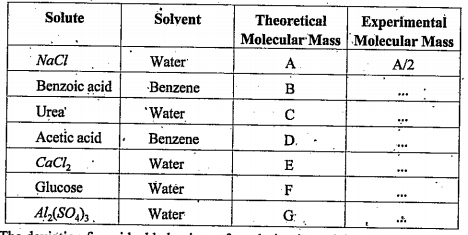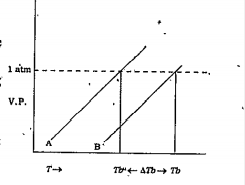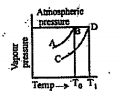Complete Solutions to QUESTION BANK of chapter SOLUTIONS of Class 12 book with complete answers and questions
| Class 12 | CHEMISTRY |
| Chapter | SOLUTIONS |
| A N EXCEL PUBLICATION | QUESTION BANK |
| Number Of Questions | 68 |
| Academic Year | 2023-24 |
Calculate the mass percentage of benzene `(C_6H_6)`and carbon tetrachloride `(CCl_4)` if 22g of benzene is dissolved in 122g of `CCl_4`
View SolutionCalculate the mole fraction of benzene in solution containing `30%` by mass in `CCl_4`
View SolutionCalculate the molarity the following solution `30g Co(NO_3)_2.6H_2O` in 4.3L of solution
View SolutionCalculate the molarity of the following solution `30mL 0.5m H_2SO_4` diluted to 500mL
View SolutionCalculated the mass urea `(H_2NCONH_2)`required to dissolved in 2.5 kg of water to form a 0.25 molal aqueous solution.
View SolutionWhen `N_2` gas is passed through water at 293 K, how many moles of ` 1N_2` would dissolve in one litre water ? Assume that `N_2` exert a partial pressure of 0.987 bar. `K_H` for `N_2` at 293 K is 76.48 kilobar.
View SolutionThe solubility of `H_2S`gas in water at STP.195m .Calculate its Henry's law constant at STP
View SolutionHenry's law constant for `CO_2` in water is `1.67xx10^8 Pa` at 298K. Calculate the quantity of `CO_2` in 500mL soda water when packed under 2.5 atm `CO_2` pressure at 298K.
View SolutionThe vapour pressure of pure liquids A and B are 450 and 700mm Hg respectively at 350K. Find out the composition of the liquid mixture if total vapour pressure observed is 600mm Hg.
View SolutionVapour pressure of pure water at 298 K is 23.8mmHg. 50g of urea is dissolved in 850g of water. Calculate the vapour pressure of water for this solution and its relative lowering.
View SolutionBoiling point of water at 750mm Hg is `99.63^@C` How much sucrose is to be added to 500g of water such that it boils at `100^@C K_b`(water)= 0.52K kg mol^(-1)`
View SolutionCalculate the mass ascorbic acid (Vitamin C, `C_6H_8O_6)` to be dissolved in 75g of acetic acid to lower its melting point by `1.5^@c`.Kf =3.9 K kg/ mol
View SolutionCalculated the osmotic pressure in pascals exerted by a solution prepared by dissolving 1.0g of polymer of molar mass 185000 in 450 mL of water at `37^@C`.
View SolutionColligative properties are properties of solutions which depend on the number of solute particles irrespective of their nature. Name the four important colligative properties
View SolutionColligative properties are properties of solutions which depend on the number of solute particles irrespective of their nature. What happens to the colligative properties when ethanoic acid is treated with benzene ?
View SolutionMr. Raju has determined the molecular masses of different solutes in different solvents by osmotic pressure measurements and present them in the following table. Please help him to complete the table
 .
.
View SolutionWhat is the significant of van't Hoff factor ?
View SolutionElevation of boiling point is a colligative property. What is colligative properties ?
View SolutionColligative properties can be used to determine the molecular mass of solutes in solutions. For determining the molecular mass of polymers, osmotic pressure is preffered to other properties. Why ?
View SolutionFor intravenous injections, only solutions with freezing point depression equal to that of 0.9% NaCl solution is used Why ?
View SolutionRelative lowering of vapour pressure, elevation of boiling point, depression of freezing point and osmotic pressure are important colligative properties of dilute solutions. Relative lowering of vapour pressure of an aqueous dilute solution of glucose is 0.018 What is the mole fraction of glucose in the solution ?
View SolutionAn aqueous solution solution of a non-volatile solute boils at 373.053K. Find its freezing point.
For water, `K_b=0.52K kg mol^(-1), K_f`= 1.86K kg `mol^(-1)`
Boiling point =373K, freezing point of water =273K
View SolutionVapour pressure of a solution is different from that of pure solvent. Name the law which helps us to determine partial vapour pressure of a volatile component.
State the above law.
View SolutionVapour pressure of chloroform `(CHCl_3)` and dichloro methane `(CH_2Cl_2)` at 298K are 200 mm and 415 mm of Hg respectively. Calculated the vapour pressure of solution prepared by mixing 24g of chloroform and 17g of dichloro methane at 298K
[At. Mass: H-1, C-12, Cl-35.5]
View SolutionColligative properties are properties of solution which depends on the number of solute particles in the solution. Write the name of four important colligative properties.
View SolutionColligative properties are properties of solution which depends on the number of solute particles in the solution. The value of van't Hoff factor, 'i', for aqueous KCl solution is close to 2, while the value of 'I' for ethanoic acid in benzene is nearly 0.5. Give reasons
View SolutionElevation of boiling point is a colligative property. What is colligative properties ?
View SolutionThe boiling point of benzene is 353.23K. When 1.80g of a non-volatile solute was dissolved in 90g of benzene, the boiling point is raised to 354.11K. Calculated the molar mass of the solute `k_b` for benzene is 2.53K kg `mol^(-1)`
View SolutionLiquid solutions can be classified as ideal and non-ideal solution on the basis of Rault's law. State Rault's law.
View SolutionLiquid solutions can be classified as ideal and non-ideal solution on the basis of Rault's law. What are ideal solutions ?
View SolutionLiquid solutions can be classified as ideal and non-ideal solution on the basis of Rault's law. Write two properties of and ideal solution
View SolutionLiquid solutions can be classified as ideal and non-ideal solution on the basis of Rault's law. What type of deviation is shown by a mixture of chloroform and acetone ? Give reason.
View SolutionOsmotic pressure is a colligative property and it is proportional to the molarity of solution. What is osmotic pressure ?
View SolutionMolecular mass of NaCl determine by osmotic pressure measurement is found to be half of the actual value. Account for it .
View SolutionCalculate the osmotic pressure exerted by a solution prepared by dissolving 1.5g of a polymer of molar mass 185000in 500mL of water at `37^@C` (R = 0.0821 L atm `K^(-1) mol^(-1)`
View SolutionMolarity (M), molality (m), and mole (x) are some methods for expressing concentration of solutions. Which of these are temperature independent ?
View SolutionDefine mole fraction.
View SolutionA mixture contain 3.2g methanol (molecular mass =32 u) and 4.6 g ethanol (molecular mass =46 u) Find the mole fraction of each component.
View SolutionAmong the following which is not a colligative property ? a) Osmotic pressure b) Elevation of boiling point c) Vapour of boiling point d) Depression in freezing point
View Solution`200 cm^3` of aqueous solution of a protein contain 1.26g of protein. The osmotic pressure of solution at 300K is found to be `8.3xx10^(-2)`bar. Calculate the molar mass of protein, (R=0.083 l bar `K^(-1)mol^(-1)`
View SolutionWhat is the significant of van't Hoff factor ?
View SolutionOsmotic pressure is a colligative property What is osmotic pressure ?
View Solution1.00g of a non-electrolyte solute dissolved in 50g of benzene lowered by 0.40K. The freezing point depression constant of benzene is `5.12K kg//mol`. Find the molar mass of solute.
View SolutionNumber of moles of the solute per kilogram of the solvent is
View SolutionThe extend to which a solute is dissociated or associated can be expressed by Van't Hoff factor. Substantiate the statement.
View SolutionThe vapour pressure of pure benzene at a certain temperature is 0.850 bar. A non-volatile, non-electrolyte solid weighing 0.5g when added to 39g of benzene (molar mass 78g `mol^(-1)`), vapour pressure becomes 0.845 bar. What is the molar mass of the solid substance ?
View SolutionOsmotic pressure is a colligative property What is osmotic pressure ?
View Solution1.00g of a non-electrolyte solute dissolved in 50g of benzene lowered the freezing point of benzene by 0.40K. Freezing point depression constant of benzene is `5.12K g//mol`. Find the molar mass of solute. .
View SolutionState Henry's law.
View SolutionWrite any two applications of Henry's law.
View Solution`1000 cm^3` of an aqueous solution of a protein contain 1.26gm of the protein. The osmotic pressure of such a solution at 300 K is found to be `2.57xx10^(-3)` bar. Calculated molar mass of the protein (R = 0.083L bar `mol^(-1)K^(-1)`)
View SolutionThe mole fraction of water in a mixture containing equal number of moles of water and ethanol is
View SolutionThe following are the vapour pressure curves answer the following questions
What do the curves A and B indicates ?
View SolutionThe following are the vapour pressure curves answer the following questions
Explain why the value of TB is greater than that of `TB^@`.
View SolutionMixing of acetone and chloroform occurs with reduction in volume and is exothermic process. What change will occurs in vapour pressure ? Explain your answer.
View SolutionRectified spirit is a mixture of alcohol and water which behaves like pure liquid and boils at constant temperature. What name can be given to such a mixture ?
View SolutionGraphical representation of solution and a solvent for boiling of 0.1 molal solution of non-volatile compound 'A' is given below : identify the curve for solvent and the curve for solution from the figure

View SolutionWill elevation is boiling point same for a 0.1m NaCl solution and 0.1 M sucrose solution. Give reason.
View SolutionSolution exhibit certain colligative properties such as elevation in boiling point, depression in freezing point , osmotic pressure. 10g of an organic substance is dissolved in two litres of water at 280 K. Find out the molar mass of the substance if osmotic pressure of the solution id 0.6 atmospheres
View Solutionsolution exhibit certain colligative properties such as elevation in boiling point, depression in freezing point , osmotic pressure. Cold ethylene glycol is added to radiator in vehicles. Which colligates property of water is involved in doing this ? Explain.
View SolutionThe value of molecular mass determined by colligative properties are sometimes incorrect. Explain how these abnormalities occur in the case of benzoic acid in benzene and KCl in water ?
View SolutionThe value of molecular mass determined by colligative properties are sometimes incorrect. What is Van't Hoff factor ?
View SolutionOut of the following solutions which has the lowest freezing point ? Give reasons
View SolutionExplain why the molecular masses of some substances determined with the help of colligative properties are lower than actual values.
View SolutionTo get hard boiled eggs, common salt is added to water during boiling boiling. Give reasons.
View SolutionWhich is the colligative property, osmosis or osmotic pressure ? Suggest application of reverse osmosis.
View SolutionAccount for the following NaCl is used to remove ice from road in cold countries .
View SolutionAccount for the following Ethylene glycol is added to radiator in automobiles.
View Solution
QUESTION BANK questions and complete solutions for chapter SOLUTIONS of A N EXCEL PUBLICATION of Class 12